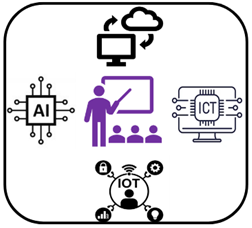Research Article | Open Access
|
Open Access
|


 | Published Online: 18 September 2025
Technology-Driven Approaches to Lifelong Learning and Community
Development
| Published Online: 18 September 2025
Technology-Driven Approaches to Lifelong Learning and Community
Development
Yusuf Sagir,1 Aminu Saidu2 and Abdullahi Usman Kofar Naisa3,*
1 Department of Social Work, Kalinga University, Raipur, Chhattisgarh, 492101, India
2 Nigerian Educational Research and Development Council (NERDC) Abuja, Federal Capital Territory, Nigeria
3 Mambayya House, Aminu Kano Centre for Democratic Studies, Bayero University, Kano, 700006, Nigeria
*Email: aukofarnaisa.mambayya@buk.edu.ng (A. K. Naisa)
J. Collect. Sci. Sustain., 2025, 1(2), 25408 https://doi.org/10.64189/css.25408
Received: 07 July 2025; Revised: 05 September 2025; Accepted: 15 September 2025
Abstract
Lifelong learning and community development are critical components of sustainable social progress. Recent advances in information and communication technologies (ICTs) have transformed the way learning occurs and the methods through which communities engage in development processes. This theoretical study explores technology-driven approaches to lifelong learning, emphasizing the integration of digital tools, smart systems, and online platforms in enhancing individual skills, promoting community participation, and fostering social cohesion. Drawing upon socio-constructivist learning theory, community informatics, and social development frameworks, this paper conceptualizes the mechanisms through which technology enhances learning opportunities and community empowerment. The study also examines artificial intelligence (AI), Internet of Things (IoT), digital literacy, and mobile learning as critical enablers of inclusive, knowledge-driven community development. It concludes by highlighting implications for social policy, educational practice, and future research directions.
Graphical Abstract
Novelty statement
This study explores technology-driven approaches to lifelong learning, emphasizing the integration of digital tools, smart systems, and online platforms in enhancing individual skills, promoting community participation, and fostering social cohesion.






